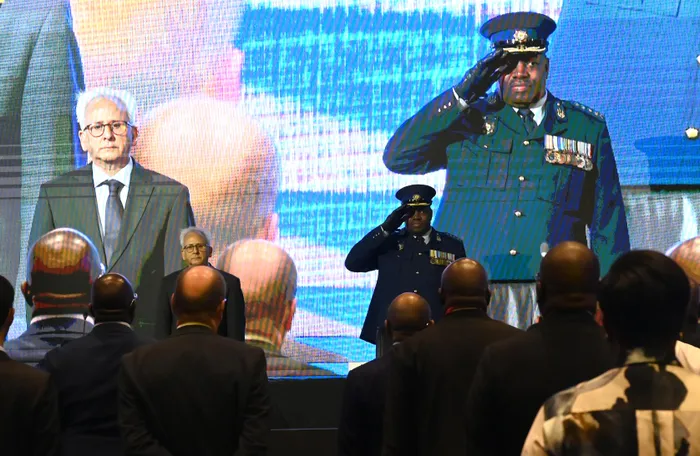
Acting Minister of Police, Prof Firoz Cachalia and National Commissioner General Fanie Masemola.
Image: Ayanda Ndamane/ Independent Media
POLICE Commissioner Fannie Masemola’s intention to return the 121 dockets to the Political Killings Task Team in KwaZulu-Natal will not undermine the work to be done by the Madlanga Commission of Inquiry into allegations of criminality, political interference and corruption in parts of the criminal justice system.
This is according to former Western Cape police commissioner Dr Lennit Max following concerns that Acting Police Minister Firoz Cachalia was interfering with operations matters with his remarks that Masemola did not consult with him over the decision to return the dockets to the team before the commission of inquiry could investigate.
The removal of the dockets from the team first came to light when KwaZulu-Natal police commissioner Nhlanhla Mkhwanazi alleged that Police Minister Senzo Mchunu had interfered in police operations by instructing the disbandment of the Political Killings Task Team and the removal of the dockets.
Mkhwanazi also accused Crime Detection Deputy Commissioner Shadrack Sibiya of being central to the decision to have the dockets housed in SAPS headquarters in Pretoria, an allegation Sibiya has repeatedly denied.
Mkhwanazi’s allegations about the capture of parts of the country’s criminal justice system led to President Cyril Ramaphosa establishing the commission, which was set to get under way today before it was postponed last week.
Reacting to Masemola’s announcement that the 121 dockets would be processed and sent back to KwaZulu-Natal so the investigation team could resume its work, Cachalia said he had requested Masemola to provide him with a detailed report on the task team, but had not yet received it.
“The Political Killings Task Team is at the centre of the allegations made by the Provincial Commissioner (Mkhwanazi) and will be dealt with by the Commission. It is a concern therefore that steps are being taken in relation to this matter before the Commission has had a chance to investigate the issues surrounding the Task Team. I have requested the National Commissioner to submit his report without further delay,” said Cachalia.
Speaking to the Cape Times, Max said the dockets had nothing to do with the commission of inquiry.
“The commission of inquiry has to investigate whether there was interference. It has nothing to do with who investigates the dockets and who cannot investigate the dockets. The national commissioner has a constitutional duty to ensure that those dockets are investigated properly. As a security measure the national commissioner said on national TV that he or his (staff) are busy making copies of those dockets to ensure those dockets don’t disappear. The minister, with due respect, might have a misconception about the reasons for the commission of inquiry because those dockets must be investigated. If the minister's intention is to block those dockets from being, it will be an interference with the operations of the national commissioner. But at this time I don't know what the minister's intention is,” he said.
The EFF said a commission of inquiry cannot replace police investigations.
“While the commission examines political interference, the police must continue their duty to investigate crime. To suggest that the return of 121 murder-related dockets should wait for the outcome of a commission is irrational. It gives reprieve to assassins, delays justice for victims and their families, and undermines the very purpose of the SAPS,” the EFF said.
Sibiya has hauled Masemola to the courts over his decision to place him on special leave.
Sibiya maintains that Masemola did not follow the law when he slapped him with the leave of absence. Masemola has also served Sibiya, with a notice of intended suspension or temporary transfer.
On tensions between Sibiya and Masemola, Max said the squabble between the country’s top cops was having a negative impact on morale and discipline within the police service.
“The tension between the deputy and national commissioner is not good for the morale of the South African police. It's not good for discipline and it's not good for effective service delivery. Sibiya is in court with the national commissioner and that needs to be played out there. “Secondly, he is being put on suspension or special leave but he is not supposed to be at work. The commission is also tasked to investigate whether his actions are in line with his responsibilities or not eroding the authority of the national commissioner..”
Cape Times
Related Topics: